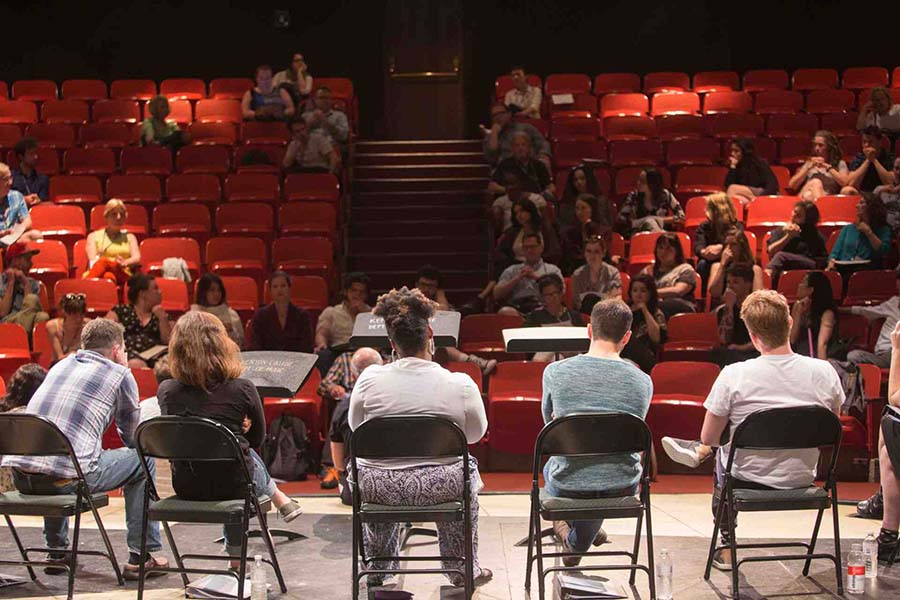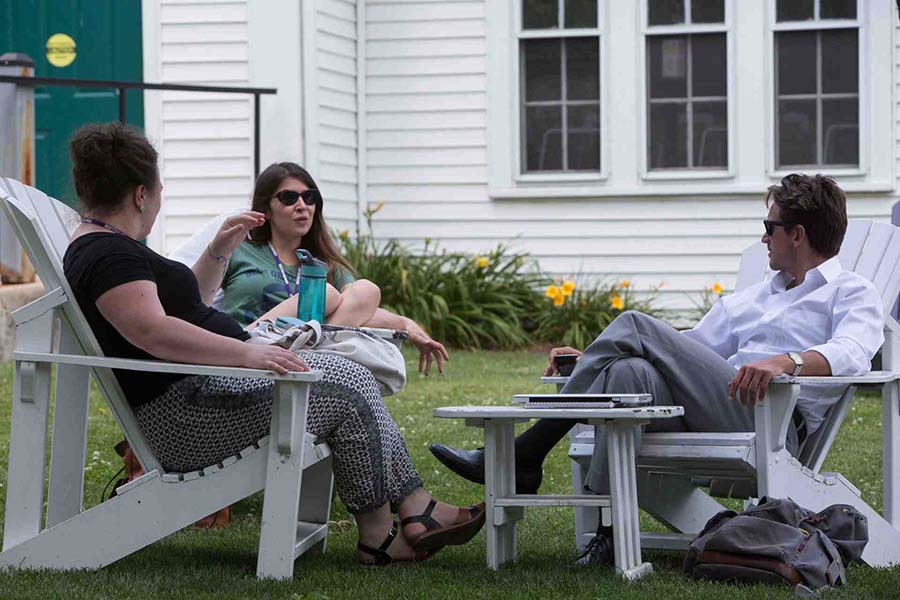At some point, after typing End of Play (perhaps several times), after sending plays into the void, after searching in vain for a local workshop, after exhausting the resources of the Official Playwrights of Facebook, the enterprising dramatist Googles “playwright conference.” It’s a leap for the classic introvert who finds comfort in the solitary desk and online distractions, but borne of a desperate desire for craft and community.
Google spits back names of competitive conferences—O’Neill, Seven Devils, Great Plains, PlayPenn—names that may be familiar by reputation, or maybe through annual, “We’re sorry, but…” emails. Holy grails all, but none an elective, all-in-one immersive industry conference, the sort that are de rigueur for other industries, offering continuing education, hands-on experimentation, feedback, access to industry experts, and the all-important netw– socializing. But five years ago, the search yielded a new link: Kenyon Playwrights Conference, which is all those things and more.
Arriving on the Kenyon College campus in Gambier, Ohio, feels like the first day of camp: the bucolic setting, “campers” registering before lugging suitcases to their assigned housing, tentative nods to playwrights who cross one’s path. Like camp, we’re here to make friends, and the structure of the Kenyon Conference makes this a snap for even the shyest attendee. Someone I met year my first year—this past June, I attended my second conference as a fellow—actually told me it was nice to see me in my human form after reading my blog for so long. As I’ve written in this post, events like this are invaluable to playwrights, even for those who have trouble breaking out of their shells. Here are some ways Kenyon assists with that issue:
- Group dining: You must choose a table to sit at, no dinner for one. And the tables are round, so it’s a cinch to talk to everyone around you. (The conference even provides opening night wine!) And guess what? Now you know people. The first night, I sat with playwright Phillip Dawkins, a four-year Facebook friend I finally got meet in person, as well as Liz Carlson, who co-moderated the night series of Open Barn readings with Gregg Wiggans. “I would encourage [theatre executives] to attend all of the meals,” says Emily Penick, literary and artistic manager or ACT in Seattle. “The group conversations with students, playwrights, literary managers, actors, directors, and artistic directors was both enjoyable and fruitful.”
- Cohorts: Each day you make the rounds of classes with the same playwrights. Three hours, every morning. These become your people. Even if you don’t make any other friends, you have this group. They’ll come hear your work at Open Barn (more on that later), they’ll meet you for breakfast, and they’ll be your companions when you venture out to the Old Village Inn, because nobody likes to enter a bar alone.
- Instructors who get it: All the instructors began with icebreakers, but Ben Viccellio’s stood out: He made us all write down three things we’d like to be seen as, and three things we think we are seen as. For the latter I wrote “unapproachable.” And sure enough, after class, a fellow playwright came up to me and said, “I did think you were unapproachable, but after you said that, I thought, ‘Why not?’” Thanks, Ben.

So now you’ve met people, and you’ve got a week to spend with them, and a week of inspiration to guide your own work as well. This is where the beauty of Kenyon—and I mean beyond the pastoral setting that makes the event double as a retreat—begins to unfold. Because here’s what’s on offer:
- Nightly Open Barn sessions where you can have work read and responded to. Gregg and Liz are expert at keep these sessions running and offering incisive and concise feedback. Playwrights anxious about sharing their work are buoyed on by cohort-mates, who often show up to support each other. “The Open Barn felt generous and open and collaborative,” says Max Webster, associate director at the U.K.’s Old Vic. “This is a Brit’s opinion, but there was an American generosity that’s very lovely. A carefulness and emotional intelligence; we Brits are a bit blunter. There was something refreshing about the candor and warmth.”
- A 30-minute one-on-one about your newest full-length work. New for 2017, this personal attention was universally lauded.
- Five three-hour intensives taught by Viccellio, playwright Wendy MacLeod, and three visiting theatre executives, all with fresh takes on the craft. In Max Webster’s class about “middles,” he noted that the dead center of the play shows a glimpse of resolution; before and after that is resistance to the quest, and acceptance of the quest. Beautifully simple. In Jill Rafson’s class on beginnings, I unlocked an idea for how to present a work-in-progress of mine that has languished in the notes phase for the better part of two years.
- Masterclasses taught by commissioned playwrights (in 2017, Dawkins, Steven Dietz, and Diana Nneka Atuona). Dawkins did a kung fu-inspired workshop that didn’t force us to do anything uncomfortable (meaning it was okay to just watch). Nneka Atuona talked about how to take an extract and use that voice to expand story and create character in history. And my favorite Dietz nugget among many was, “Don’t seek a poetic solution to a structural problem.”
- Observation of rehearsals of the commissioned plays, which culminated with readings of said plays, followed by talkbacks. (Dietz’s talkback was a revelation, and I’ve stolen—and, upon request, shared—his brilliant questions for every talkback I’ve had since!)
- Career classes on submission and marketing, and being a #PLONY (Playwright Living Outside New York)
- Special presentations (this year, by Steppenwolf’s Ed Sobel)
- Open writing time
- Evening gatherings at the Old Village Inn. What’s particularly nice about this is that there’s really nowhere else to go, so everybody’s there, instead of breaking into smaller, more exclusive groups.
This bountiful modular menu allows playwrights to create a schedule that works best for not just their personality, but also their needs for sleep vs. writing time. In my two years of attendance, I found playwrights came to the conference with one of two minds. Some come to work on existing plays, to which they applied every exercise, every lesson. In 2016, I found this worked particularly well with two plays, one that became a 2017 O’Neill finalist, and one that won a New York State Council on the Arts Individual Artist grant. This year I focused on a commission I desperately needed to begin, and the scenes generated gave me the necessary jumpstart.

Other playwrights, though, use every exercise as a prompt to create new work, so that the inspiration generates pages long beyond the conference. There’s no right or wrong; it’s your conference.
And yet, even though it’s billed as a playwrights’ conference, theatre leaders who come to spend a week developing work with their commissioned playwrights find living among a mass of playwrights has unexpected benefits.
“I loved hearing parts of people’s plays both in class and at the Open Barn,” says ACT Seattle’s Penick. “I definitely did a little talent scouting, if I’m perfectly honest. And, as a literary manager, I found attending the playwrights’ masterclasses fascinating. It was a beautiful window into their creative processes and methodologies.”
For Old Vic’s Webster, the biggest takeaways were forging connections with American theatre artists and leaders, and a “bunch of energy. Normally, if we’re working on something for a week, it’s quite results-oriented, [perhaps] a play that’s developing, so there’s pressure. It felt very nice to think about playwriting in a more general and abstract sense, and to have those blue-sky conversations about what a play can be, or why we bother in the first place. It reminded me about people’s enthusiasm for making theatre. Sometimes when we feel we’re batting off projects, it’s a struggle to keep head above water.”
But Kenyon’s impact doesn’t end when the lingering goodbyes are finally accepted, the cars packed, and the participants en route to homes as geographically diverse as their plays. That’s because no-pressure conversation and camaraderie still yields results, not the least of which is lasting friendships that manifest in late-night Facebook chats, couch crashing, and, yes, collaboration. The Pulse Project, a collection of monologues inspired by the Orlando shooting that took place the first day of Kenyon 2016, was written by four alumni, and is testament to the power of putting playwrights in the same place and moving them to share, bond, write, and carry their art and inspiration beyond one short week in the rural Midwest.





